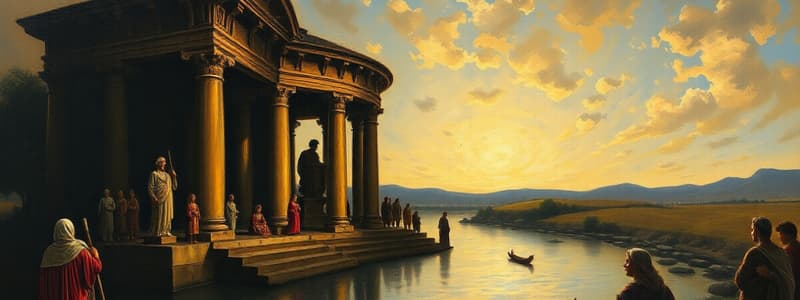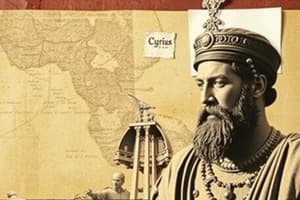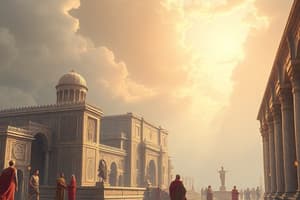Podcast
Questions and Answers
What approach did Cyrus the Great take towards the cultural practices of the peoples he conquered?
What approach did Cyrus the Great take towards the cultural practices of the peoples he conquered?
- He promoted only Persian cultural practices.
- He allowed conquered peoples to maintain their cultural practices and religions. (correct)
- He enforced a singular culture across the empire.
- He banned all local customs to unify the empire.
Which ruler is noted for expanding the Persian Empire into Egypt but neglecting the local traditions?
Which ruler is noted for expanding the Persian Empire into Egypt but neglecting the local traditions?
- Cambyses (correct)
- Xerxes
- Cyrus the Great
- Darius I
What was a significant action taken by Cyrus the Great that demonstrated his respect for local customs?
What was a significant action taken by Cyrus the Great that demonstrated his respect for local customs?
- He authorized the return of Jewish exiles to rebuild their temple in Jerusalem. (correct)
- He ordered the construction of palaces in Persian style.
- He banned all foreign religions.
- He forced the Persians to adopt Babylonian practices.
How did the administration of the Persian Empire under Cyrus and his successors exemplify governance?
How did the administration of the Persian Empire under Cyrus and his successors exemplify governance?
What characteristic defined the legacy of Cyrus the Great's rule over the Persian Empire?
What characteristic defined the legacy of Cyrus the Great's rule over the Persian Empire?
What was a significant aspect of Darius I's administrative reforms in relation to governance in the provinces?
What was a significant aspect of Darius I's administrative reforms in relation to governance in the provinces?
What was a key feature of Darius I's approach to cultural practices within the Persian Empire?
What was a key feature of Darius I's approach to cultural practices within the Persian Empire?
Which statement accurately reflects the relationship between Darius I's military campaigns and his governance style?
Which statement accurately reflects the relationship between Darius I's military campaigns and his governance style?
What infrastructure development did Darius I implement to enhance trade and communication?
What infrastructure development did Darius I implement to enhance trade and communication?
What legacy did Darius I and earlier Persian leaders leave that influenced future empires?
What legacy did Darius I and earlier Persian leaders leave that influenced future empires?
Flashcards
Cyrus the Great's Rule
Cyrus the Great's Rule
Cyrus the Great's Persian empire was marked by tolerance toward conquered people - allowing them to keep their cultures and religions. This approach contrasted with subsequent rulers' policies.
Cyrus's Mandate
Cyrus's Mandate
Cyrus authorized the return of Jewish exiles to Jerusalem to rebuild their temple. This shows respect for local customs and faiths.
Persian Empire's Zenith
Persian Empire's Zenith
The height of the Persian Empire's success and power occurred under rulers like Darius I, building upon the foundations laid by Cyrus.
Cambyses's Reign
Cambyses's Reign
Signup and view all the flashcards
Cyrus's Death
Cyrus's Death
Signup and view all the flashcards
Darius I's Administrative Reforms
Darius I's Administrative Reforms
Signup and view all the flashcards
Persian Royal Road
Persian Royal Road
Signup and view all the flashcards
Persian Empire's Cultural Tolerance
Persian Empire's Cultural Tolerance
Signup and view all the flashcards
Satrapies
Satrapies
Signup and view all the flashcards
Darius I's Kings' Eyes and Ears
Darius I's Kings' Eyes and Ears
Signup and view all the flashcards
Study Notes
The Rise of Persia
- The Persian Empire marked a significant shift in governance, focusing on tolerance and diplomacy, unlike the Assyrians who relied heavily on military force.
- The Persian Empire originated from a region rich in natural resources and fertile lands.
- Location: Persia encompassed modern-day Iran, extending from the Caspian Sea to the Persian Gulf.
- Early Inhabitants: Indo-Europeans migrated to the area around 1000 BCE, settling in mountainous and plateau regions.
- Natural Resources: Persia boasted copper, lead, gold, silver, and lapis lazuli, facilitating trade with neighboring cultures.
- Initial Kingdoms: Numerous small kingdoms initially occupied the region.
- Major Powers: Two key powers emerged, the Medes and the Persians. The Persians, led by Cyrus the Great, eventually surpassed the Medes.
Cyrus the Great
- Cyrus the Great (559-530 BCE) initiated military campaigns, creating one of history's largest empires, extending 2000 miles from the Indus River to Anatolia.
- Military Genius: Cyrus's tactical skills and leadership resulted in numerous victories.
- Tolerance and Kindness: Cyrus's approach to ruling was different from earlier conquerors, valuing customs and religions of conquered peoples, and forbidding looting.
- Jewish Resettlement: Cyrus allowed Jewish exiles to return to Jerusalem in 538 BCE to rebuild their city and temple. This action was viewed as a major display of kindness and is remembered in the Hebrew Bible.
Persian Governance and Legacy
- Divided the empire into provinces (satrapies).
- Each province had a satrap (governor) overseeing local customs while remaining under Persian oversight.
- Appointed military leaders and tax collectors in each province.
- Utilized inspectors ("King's Eyes and Ears") to ensure loyalty and maintain order.
- Established the Royal Road, improving communication and trade (1677 miles from Susa to Sardis).
- Introduced standardized metal coins for efficient commercial transactions.
Cultural and Administrative Tolerance
- Religious Freedom: People were largely allowed to practice their own religions.
- Local languages and customs were preserved.
- The Persian policy of tolerance contrasted with the brutal and assimilationist practices of previous empires like the Assyrians.
- The Persians preserved local cultures by respecting local customs, allowing local governance, and by incorporating details from earlier civilizations.
Persian Rule - Key Empires and Rulers
- Cyrus the Great (c. 559–530 BCE): Unified Persian tribes, conquered the Medes, Lydians, and Neo-Babylonians. Emphasized tolerant governance, allowing conquered peoples to keep their customs and religions. Authorized Jewish exiles to rebuild their temple.
- Cambyses (530–522 BCE): Conquered Egypt, but his neglect of Egyptian customs led to unrest and rebellion after his death.
- Darius I (522–486 BCE): Seized the throne with the aid of the "Ten Thousand Immortals." Expanded the empire into parts of modern Afghanistan and India.
The Persian Legacy
- The Persian Empire represented a model of empire, incorporating respect for diversity and effective administration.
- Shaped the development of later empires and influenced their administrative practices.
Zoroastrianism
- Zoroaster (c. 600 BCE) was a Persian prophet whose teachings addressed the existential questions of suffering and chaos.
- Zoroastrianism is a dualistic religion, emphasizing the battle between good (Ahura Mazda) and evil (Angra Mainyu).
- Zoroastrians believe in personal responsibility and the need to actively choose good over evil.
- Zoroastrian concepts influenced other major religions like Judaism, Christianity, and Islam.
Studying That Suits You
Use AI to generate personalized quizzes and flashcards to suit your learning preferences.




